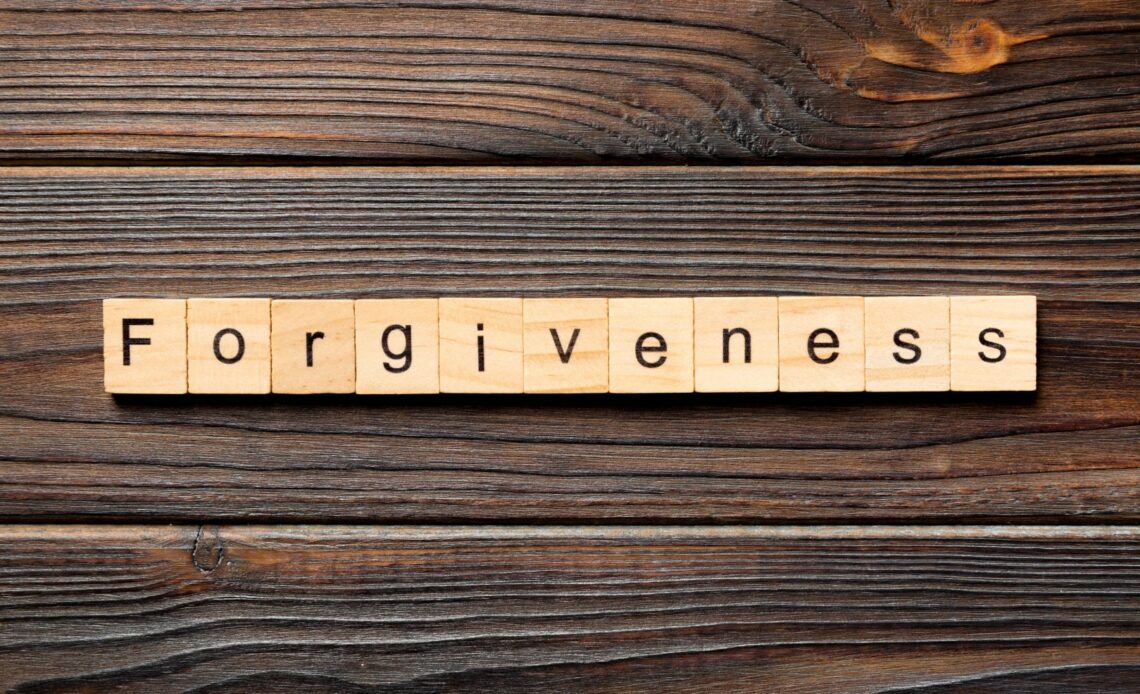Finding the inner-strength necessary to forgive others is one of the most challenging aspects of holy living. When we’re faced with the pain that is caused by someone who we trusted betraying us, it’s hard for us to release forgiveness. However, that’s exactly what God wants us to do.
Today, allow the Holy Spirit to help you discover areas in your life in which you’re harboring unforgiveness. Releasing forgiveness not only sets you free, but it also puts your life in better alignment with God’s will.
Matthew 18:23-27 (NLT)
“Therefore, the Kingdom of Heaven can be compared to a king who decided to bring his accounts up to date with servants who had borrowed money from him. In the process, one of his debtors was brought in who owed him millions of dollars. He couldn’t pay, so his master ordered that he should be sold, along with his wife, his children, and everything he owned-to pay the debt. But the man fell down before his master and begged him, ‘Please, be patient with me, and I will pay it all.’ Then his master was filled with pity for him, and he released him and forgave his debt.”
The greatest need that all of humanity experiences is the need for forgiveness. On a natural level, all of us need forgiveness to make our relationships with other people work.
No matter how good of a person you are, not matter how loyal you are to your friends, no matter how good you are to your family members, there will be times where you say something or do something that harms those relationships. Without forgiveness, those relationships would be forever damaged. We need forgiveness in order to keep us connected to other people.
On the spiritual level, our need for forgiveness is even more important. On our best days, we don’t live up to the standards that God has for us. That’s not an excuse to not even try. Instead, it simply points to the fact that humans have an inherently fallen nature that leaves us in constant conflict with the things that God has for us.
Without God’s forgiveness, each of us would be facing eternal separation from God. However, with God’s forgiveness, we can rest in the assurance that we are in an intimate relationship with Him.
In the story we just read, Christ compares our need to forgiveness to the forgiveness offered by a certain king. He had allowed a man to borrow a large sum of money which the man was not able to repay. In order to settle up the debt, he was going to make the man and his family slaves, in addition to selling everything he owned. However, when the man asked for mercy, the king decided to absolve him of his debt.
In the verses that follow the section of the story that we just read, the newly forgiven man walked out of the king’s presence and found a man who owed him a much smaller amount of money. He grabbed the man and threatened him if he didn’t repay him.
When that man asked for mercy, the man who had been released from his debt to the king refused to listen to him and insisted that he repay him. When the king found out about this interaction, he was angry. In fact, he was so angry that he sentenced the man to be tortured in prison until his entire debt could be repaid.
That’s how seriously God takes forgiveness. We are the products of forgiveness, and he expects us to release that same kind of forgiveness to others. Today, discover the power of the pardon, and how important it is that we forgive other people.

We Want Revenge
Matthew 18:21-22 (NLT)
Then Peter came to him and asked, “Lord, how often should I forgive someone who sins against me? Seven times?” “No, not seven times,” Jesus replied, “but seventy times seven.”
This was the conversation that sparked the parable that Jesus taught to His disciples. Peter was asking Jesus about when it was acceptable to cut off forgiveness. It’s no secret that Peter was a bit of a ‘hot head,” so there’s a good chance that he was angry at someone when he asked this question.
Peter assumed that if he offered someone forgiveness seven times, it was acceptable to get even with them on their eighth attempt.
Can you imagine the surprise in Peter’s face when Jesus told him that seven times wasn’t enough? Jesus didn’t slightly increase the number either. Instead, He said that Peter should forgive others “seventy times seven times.” That’s 490! Jesus wasn’t setting a concrete number for Peter to live up to. Instead, He was speaking about the importance of extending perpetual forgiveness.
No matter how hard it is, God does not want us to look for ways to get even with people. Instead, He expects us to continue to offer forgiveness to people.
We Must Forgive Ourselves
1 John 3:20 (NLT)
Even if we feel guilty, God is greater than our feelings, and he knows everything.
Forgiving ourselves is one of the most difficult things that we’re taxed with doing. When we know that we have done something that brings pain or sadness to someone that we care about, it’s easy for us to continue to wallow in guilt, even after the person has expressed their forgiveness to us. However, God wants us to offer ourselves the same forgiveness that we offer to other people.
In most cases, our lack of self-forgiveness stems from shame associated with our actions. However, John teaches us that “God is greater than our feelings.” Take a moment and think about how far-reaching that statement is. No matter what you’re feeling, what God knows is more important.
Today, show yourself the same kind of forgiveness that you show to other people. It may sound odd, but some of us are better at forgiving others than we are at forgiving ourselves. If you know that you have sought forgiveness from the person that you hurt, and you know that you have asked God for forgiveness, forgive yourself. Doing so will set you free from the fear and shame associated with constantly belittling yourself for the things that you have done wrong.
Directional Forgiveness
Matthew 6:14-15 (NLT)
“If you forgive those who sin against you, your heavenly Father will forgive you. But if you refuse to forgive others, your Father will not forgive your sins.”
Finally, forgiveness is a directional concept. In order for us to enjoy vertical forgiveness (the kind that flows from God to us), we must display horizontal forgiveness (the kind that flows from us toward others). Isn’t it remarkable to know that forgiving others is the key to receiving forgiveness from God?
God will not give us what we’re not willing to give others. However, when we understand two foundational concepts about forgiveness, it becomes much easier for us to forgive others. First of all, our relationship with God is the product of forgiveness. We cannot meet God’s standards for living, so the only way that we can stay in relationship with Him is through His forgiveness. Secondly, we cannot experience that forgiveness if we refuse to extend forgiveness.
As we get ready to close today’s study, ask yourself if there are any people that you haven’t forgiven. Perhaps you’ve been carrying around the bitterness associated with someone betraying you years ago, and you just haven’t let go of the pain and the animosity associated with their betrayal.
If so, you cannot fully experience God’s forgiveness. Ask the Holy Spirit to help you identify any areas in your life where unforgiveness is living and remove it today. Doing so not only allows you to free yourself from the wait of unforgiveness, but it also ensures that you’re in a position to receive God’s forgiveness.
A Closing Prayer:
Heavenly Father, I know that I am only here because You have forgiven me. Help me to be quick to forgive others. When I think about the way that others have hurt me, help me to shift my focus to the vastness of Your forgiveness to me. In Christ’s name, Amen.


